'The rest of the city is pissed off with you': How activists stay hopeful in cynical times
Hochul's U-turn on congestion pricing was a recipe for breeding cynicism. Activists tell us how they fight back anyway
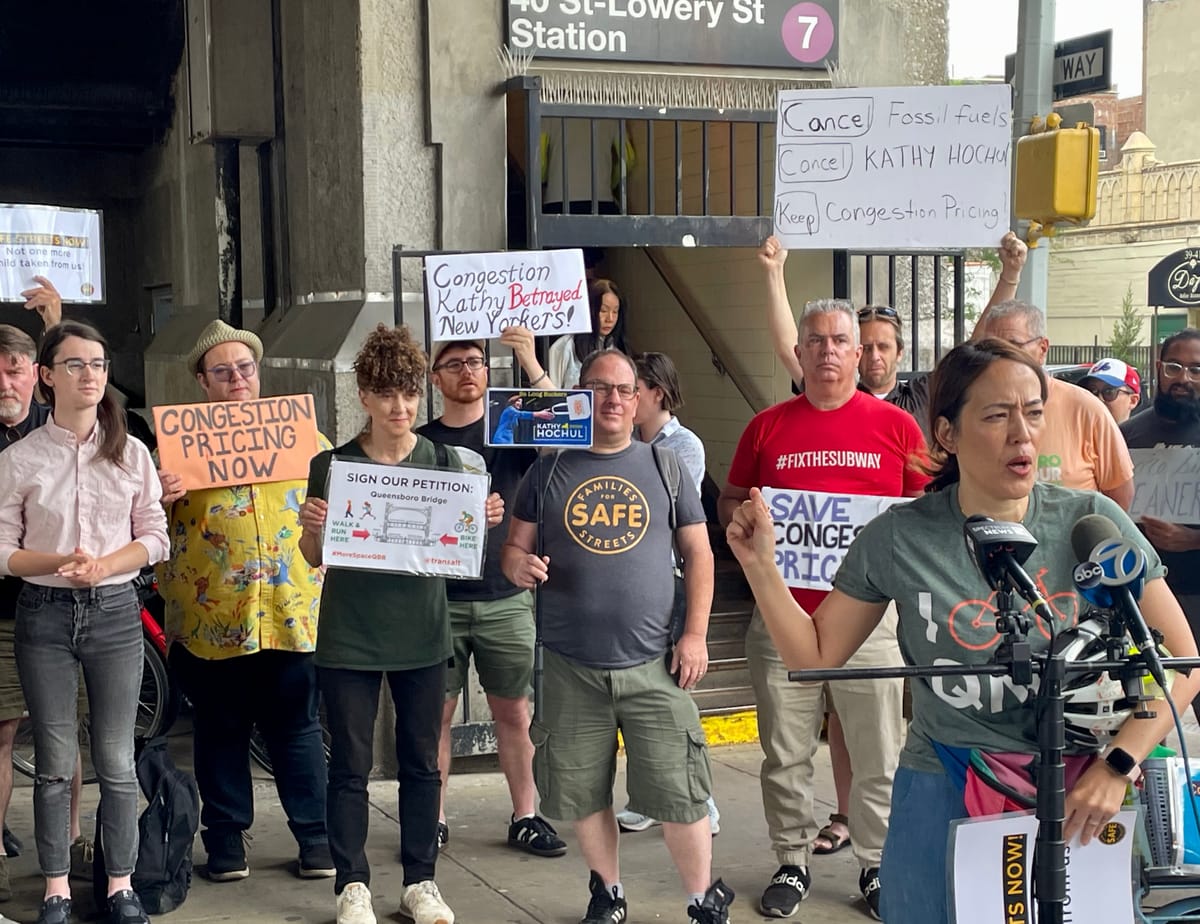
Gov. Kathy Hochul’s abrupt U-turn on congestion pricing last week was so jarring for both its sheer cowardice and its capitulation to the idea that better things are not, in fact, possible when a few suburban voters might be inconvenienced. But beyond all that, the whole thing is baffling because — even in the halls of Albany, where good ideas go to be gutted by special interests and secret cabals still run the show — it’s still just not how politics is supposed to work.
The governor single-handedly undid five years of hard, time-consuming government work and 15 years of advocacy, waiting until so far past the point of no return to pull the plug that half a billion dollars were wasted on toll collecting infrastructure that will sit unused, at least for now. It all has a “somehow, Palpatine returned” vibe to it; Like, ok, but I felt like you should have mentioned this earlier, we missed a few steps in storytelling there.
All of it is a perfect recipe for breeding cynicism, and people keep having plenty of reasons to be cynical lately. What’s the point of years worth of discussions, activism, planning, millions of dollars in resources and many lugubrious but very necessary public review periods if one person can throw it all into chaos with a single pre-recorded video? It’s hard not to feel like the scale of our crises — crowded, unsafe streets and a burning planet — will outpace our chances to do anything about them.
“It makes you feel like all the hard work was for naught,” said Chong Bretillon, 43, a volunteer with Transportation Alternatives and a Dutch Kills, Queens resident. “It’s just for nothing. And it makes you not want to trust people, it makes you not want to trust these politicians any more.”
I was curious to know more about how people find a path through the cynicism right now so I visited a pro-congestion pricing rally in a utilitarian location, a plaza under the 7 train station in Sunnyside on Tuesday morning, with loud engines ripping by on Queens Boulevard competing with the voices of protesters. Here’s what I learned:
Count your victories
At the rally, Bretillon told me she’s been involved in streets activism since 2017 when train shutdowns led her to start using Citi Bike. When she saw the congestion pricing toll readers installed on her bike to work in Manhattan, she allowed herself some optimism.
“That’s when I knew it was a done deal, because they wouldn’t waste all that time and money installing those,” she told The Groove. She called Hochul’s sudden move “demoralizing.”
“It just makes you feel like this is one big game and people with the most money and the most influence can just pick up the phone, call her, scare her off of it,” she said. “Even if you didn’t support it, even if you’re against congestion pricing, you’re happy that a governor can just decide to renege on a law just because [they] don’t like it? I mean that’s not how politics should work, that’s not how anything should work.”
Yet she still rallied with about 30 others for two hours Tuesday afternoon in the plaza and outside a nearby community nonprofit, verbally committing to future rallies while noting that she didn’t even check her calendar to see if she was free that day. I asked her how she finds her way back to optimism in spite of those feelings, and she noted out that not every effort gets stalled out so pathetically. She pointed to Crescent Street, once “basically a speedway,” as she called it, full of car front ends and tail lights from car wrecks, that now has a two-way bike lane.
“We fought to get that bike lane in, and now I can ride on it with my son,” she said of her 11-year-old. “I’m literally riding on bike infrastructure that I helped put in, and it just feels very rewarding.”
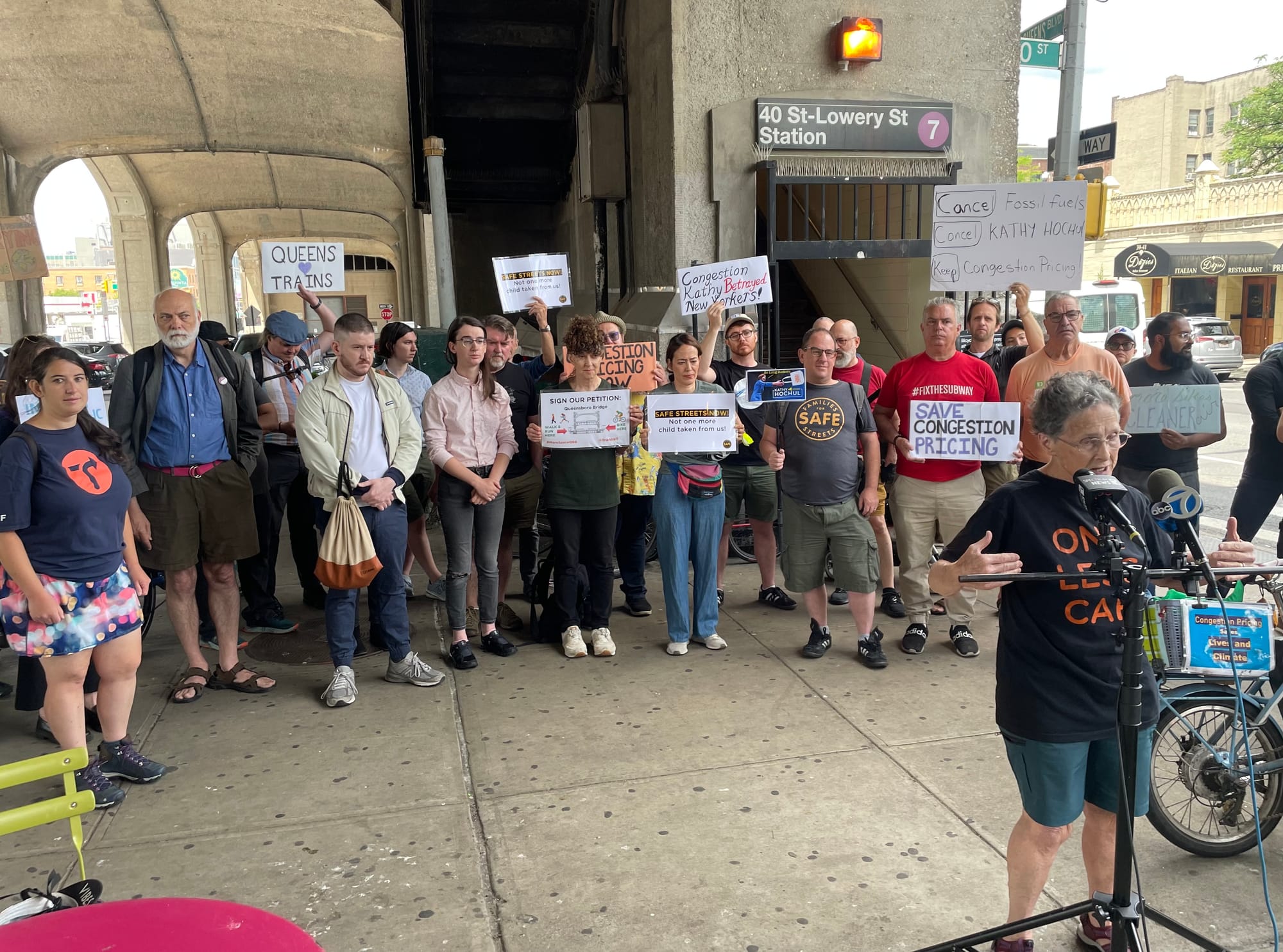
Borrow from the Nixon playbook
Similarly, Rosamond Gianutsos told me she’s seen enough changes over a long period in the neighborhood to see the long picture. When she moved to the city for college in 1962, the city barely had any bike lanes.
“Now they are almost everywhere that I need to go,” she said, standing by her cargo bike. “When I go to my doctor, I ride on a protected bike lane into the city, over the bridge, in the city, practically door to door.” More specifically, she pointed to the recent successful efforts to get the Queens Boulevard bike lane completed.
Gianutsos serves on Queens Community Board 2 and said she’s been advocating for congestion pricing for “centuries,” or at least since the very early discussions on it, which date back to the John Lindsay administration in 1969. I asked how she bounces back from Hochul’s backstabbing.
“I come back stronger,” she said, joking that she takes inspiration from an unlikely source: “I saw Richard Nixon leave office in disgrace, and a few years later he came back as a statesman, which is crazy.”
If Nixon can win people over, she said, so can you: “You just have to stay in it and with it. And keep speaking up and speaking out. And trying to help the people who understand why this is gonna make us a cleaner, safer community.”
Get your boots on the ground for the next fight
Liam Jeffries is too young to be inspired by Nixon but he’s spent his entire 26 years living in Manhattan, mostly around the base of the Queensboro Bridge, remembering being told as a kid never to play in the street because it was too dangerous. On Tuesday, he told me he draws energy from the reaction he saw across the largest city in Kathy Hochul’s state this week.
“The thing that gives me hope right now is the fact that the New York populace at large appears to be as angry about this as we are,” he said.
Congestion pricing had still, he said, been a bit of a niche topic in transit geek circles. Now everyone was talking about it.
Don’t ever tell us there’s no movement for congestion pricing pic.twitter.com/CZ2JkscCdQ
— Open New York (@OpenNYForAll) June 12, 2024
“When this announcement came in … this appears to have activated so much latent support among people in New York for this," he said.
I asked Gianutsos, 79, what advice she’d give to young activists who are flirting with nihilism right now, both from Hochul’s upending of the plan for the most craven of Democratic swing voter courtship, and by the looming sense in many young people that our leaders are just not up for the moment at hand, so what's the point. She said to make sure to vote, which is advice that can feel like cheap comfort sometimes, if the city’s consistently low voter turnout rates didn’t prove it necessary.
“We can vote the governor out,” she said, though she isn’t up for reelection until 2026. “Speak up, be engaged, be involved.”
Bretillon said anyone feeling frustrated should get involved with activism around the issue, “And really realize that nobody here is a professional,” she said. “You hear from a cross section of New Yorkers, and we’re all in this together."
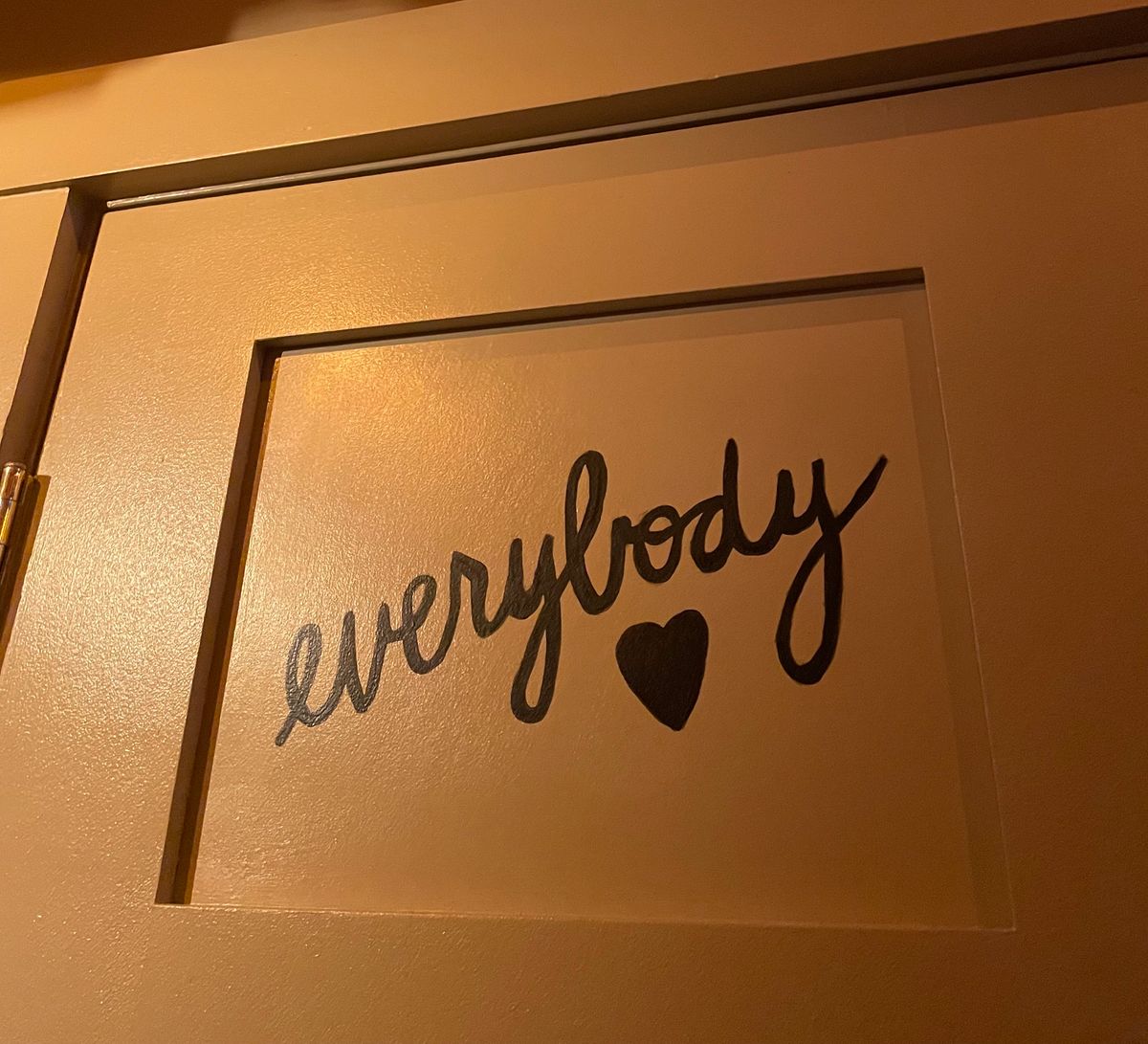
She found there's room in activism for all schedules and skill levels.
"You can contribute what you can and that’s fine," she said. "And I think that’s what keeps me motivated .”
Jeffries has already feels the weight of caring about something and watching it crumble.
“This is probably the most outraged I've ever been by a Democratic party policy decision in my time in New York politics.”
Yet, he still sees hope that public pressure can convince Hochul that the "temporary pause" of the plan should be lifted.
“Be optimistic in the fact that you’re not the only people that are pissed off," he said. "You’re not pissed off in a bubble, the rest of the city is pissed off with you.”


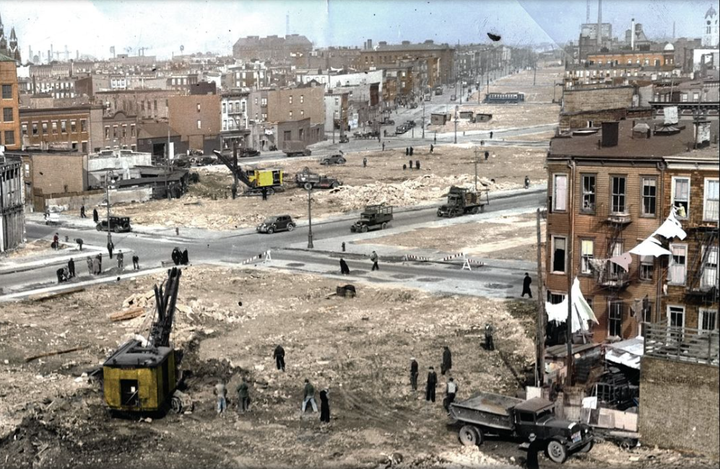
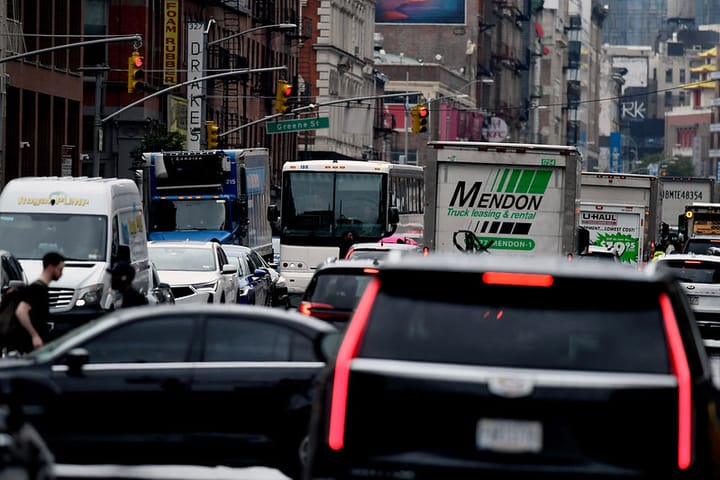
Comments ()